Best Hearing Aids of 2025: Audiologist Reviewed
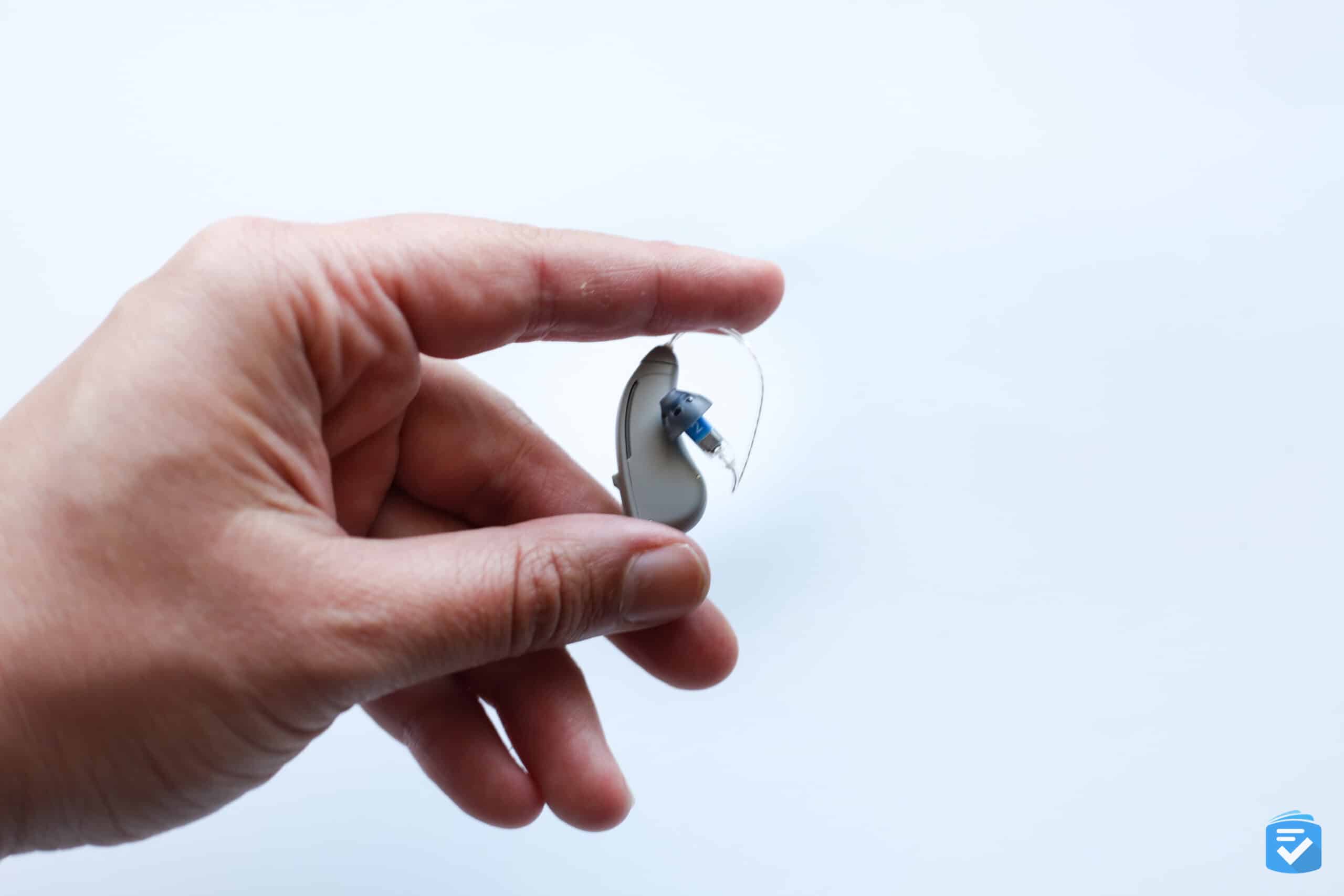
Key Findings
- Jabra Enhance hearing aids cost as low as $995 for a pair, and they’re one of the few brands that supports Bluetooth audio streaming.
- Eargo hearing aids are nearly invisible when worn, and all pairs include lifetime support from the company’s hearing specialists.
- MDHearing hearing aids forego advanced features like smartphone apps and Bluetooth streaming, but they cost as little as $300 per pair.
Why Trust TheSeniorList?
Every hearing aid is different, and there’s hardly a one-size-fits-all device. That said, here is what we looked for when testing devices.
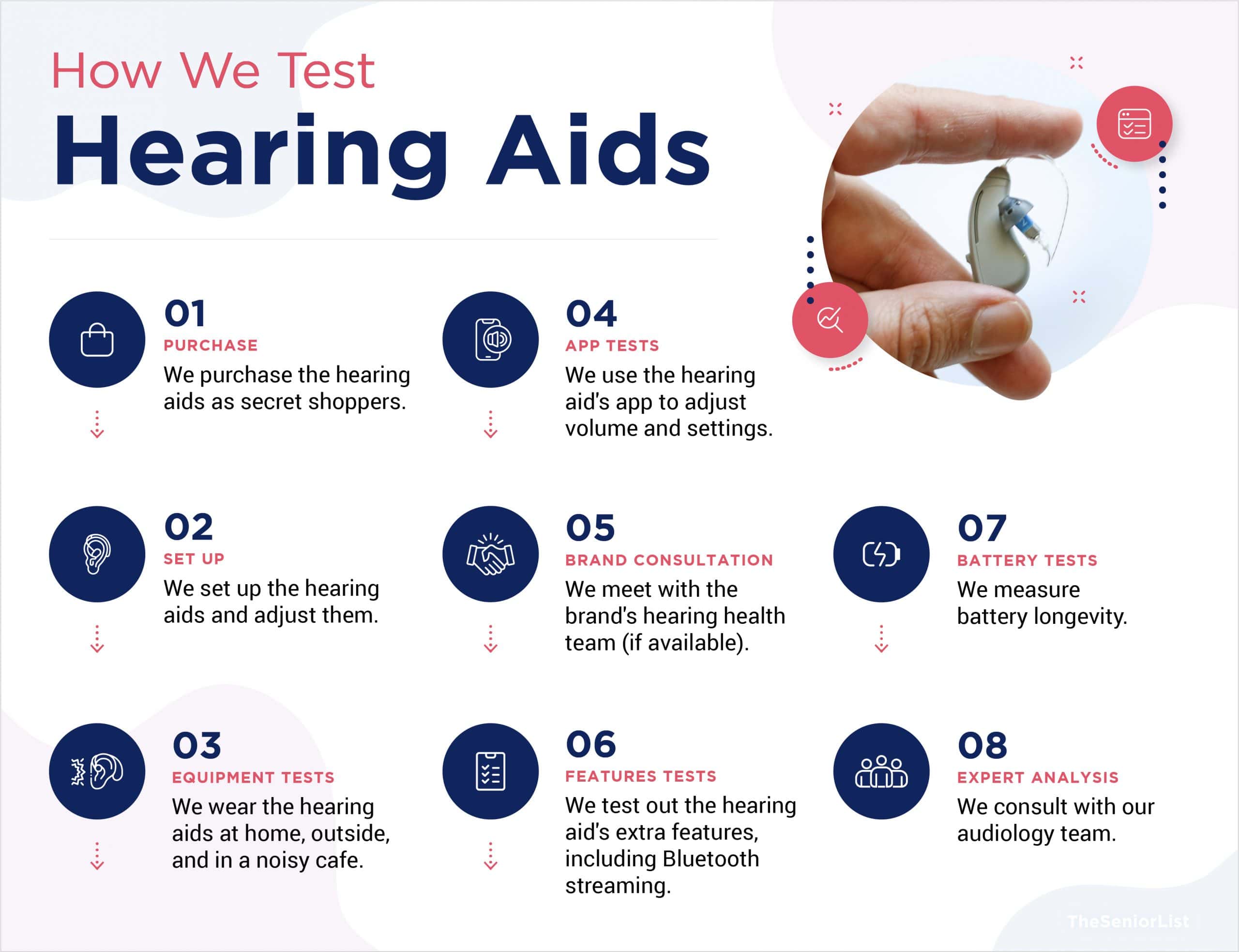
- Style and fit: Hearing aids come in several shapes and sizes, from hardly visible in-ear units to larger, more traditional models that fit over the ear. Since you’ll likely wear your device often, it’s always a good idea to try a few different hearing aids and see which ones are most comfortable. When determining the best style of hearing aid for you, the number-one factor will be your type of hearing loss.
- Battery function and type: In addition to long battery life, you’ll want to find a hearing device with batteries that are easy to replace. Many hearing aids use rechargeable batteries, ensuring you won’t have to travel to the store to keep your device powered.
- Lifestyle: Your hearing aid needs will depend on your activity level. Are you often outdoors or in noisy environments, or do you tend to remain at home, having conversations with little background noise? Whatever your situation, a trustworthy manufacturer should be able to advise you of which models suit your particular lifestyle.
- Trials and warranties: Hearing aids can run anywhere from $300 to $5,000. With this in mind, we recommend going with a hearing aid that offers a risk-free trial period in addition to a warranty, ensuring that you get your money’s worth for such a costly product.
- Customer support: Despite their simple appearance, it’s common to run into technical or maintenance issues with hearing aids. To address this, you’ll want to make sure the retailer has staff on hand or specialist centers, where you’ll have access to expert advice on how to use your hearing aid.
FYI: New to the world of hearing aids? Then check out my hearing aid buying guide to learn about all things related to fitting, types of hearing loss, and how to begin your process.
The 5 Best Hearing Aids of 2025
- Jabra Enhance : Best Support From Hearing Specialists
- Eargo : Most Discreet Hearing Aids
- MDHearing : Most Affordable Hearing Aids
- Lexie : Best Audio Quality
- Widex : Best for Severe Hearing Loss
Hearing Aid Companies Compared
|
Jabra Enhance
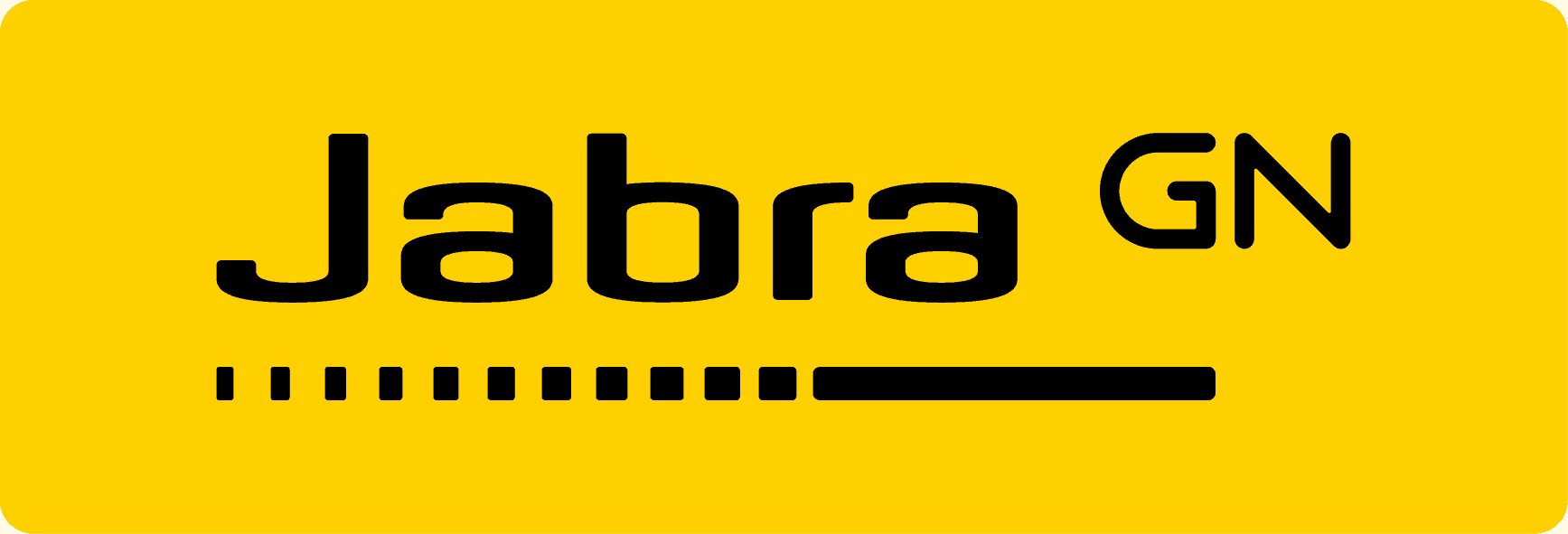 |
Eargo
 |
MDHearing
 |
Lexie
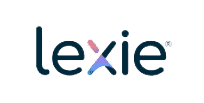 |
Widex
 |
|
|---|---|---|---|---|---|
| Rating out of 5 | 4.7 | 4.7 | 4.6 | 4.4 | 4.1 |
| Cost for a Pair | $995 – $1,995 |
$1,650 – $2,950 |
$297 – $397 |
$799.99 – $990 |
$3,000 – $6,000 |
| Trial Period | 100 days |
45 days |
45 days |
45 days |
Varies |
| Warranty | 3 years |
1-2 years |
90 days |
1 year |
Varies |
| Read More | Jabra Enhance Review | Eargo Review | MDHearing Review | Lexie Review |
The Best Hearing Aids of 2025
1. Jabra Enhance - Best Support From Hearing Specialists
 View Packages
Links to Jabra Enhance
View Packages
Links to Jabra Enhance
What We Like Most:
- Personal support from trained audiologists
- Small, lightweight, and easy to wear
- Adjustable settings via app
- Priced from $995 for a pair

Overview
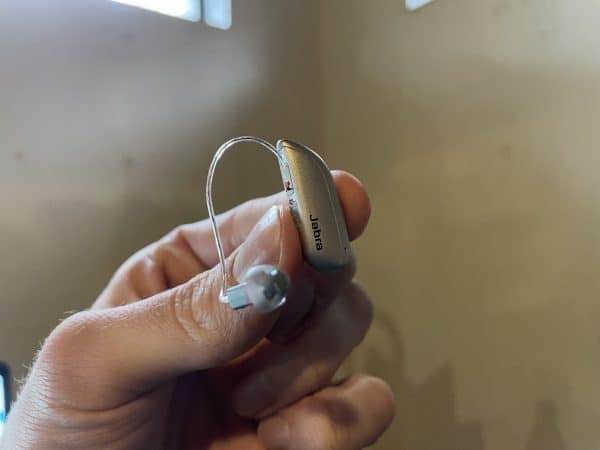
Cost: $995-$1,995 for a pair
Overview
For people with mild to moderate hearing loss, there’s hardly a better hearing aid than one from Jabra Enhance. Their hearing aids help one focus on conversation and tune out background noise, even in loud environments. Best of all, they start at $995 for a pair, making them far more affordable than traditional hearing aids.
What Stood Out
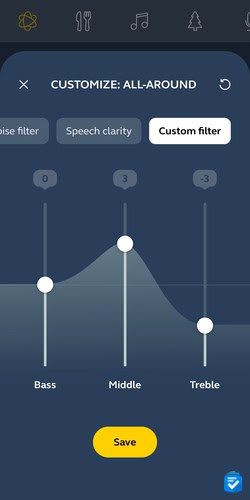
Of all the hearing aids we tested, Jabra Enhance models had the longest return window at 100 days. Since no hearing aid is the perfect fit for all users, this is important, as it allows ample testing time.
In our experience using Enhance Select 300, Jabra’s premium model, we found that it worked well in a variety of environments. Our team noticed that, compared to the other hearing aids on this list, Enhance Select 300 devices did an exceptional job at reducing background noise and amplifying the noise of conversation. In particular, they performed well in a crowded restaurant — a place where most hearing aid models struggle.
We also appreciated the customer care with Jabra Enhance hearing aids. If you purchase one of their models and shell out the additional $200, you’ll receive three years of remote support from hearing specialists. They were even able to program our hearing aids from afar — no in-person visits required.

Pricing
Jabra Enhance hearing aids cost between $995 and $1,795, depending on the specific model. Regardless of the model, you can pay an extra $200 for Jabra’s “Premium” package. This extends the one-year warranty to three years, and it also gives you three years of remote assistance from Jabra’s hearing specialists.
To learn more about our experience with their specialists, read our guide to Jabra Enhance pricing.
Drawbacks
While Jabra Enhance hearing aids support Bluetooth streaming from smartphones, only their most advanced model, the Select 300, supports the streaming of phone calls. Additionally, this feature is only compatible with iPhones, not Android phones.
Our Verdict
Combining affordability with advanced features like Bluetooth audio streaming and remote sound adjustments, Jabra Enhance hearing aids are our top pick.
To learn more about Jabra Enhance hearing aids, check out our Jabra Enhance hearing aids review.
Pros
- Easy and comfortable to wear
- High-quality sound
- Ongoing support from hearing professionals
- Easy-to-adjust settings
- Bluetooth compatible
- 100-day return window
Cons
- Professional support costs extra
- No in-person fittings
2. Eargo - Most Discreet Hearing Aids
What We Like Most:
- Rechargeable batteries
- Virtually invisible in-ear models
- Lifetime support from hearing specialists
- Remote adjustments via smartphone app
Overview
Cost: $1,650-$2,950 for a pair
Overview
If you’re self-conscious about the appearance of hearing aids, then Eargo offers incredibly small devices that are practically invisible when worn. Despite this small size, they sacrifice little in terms of features and sound quality.
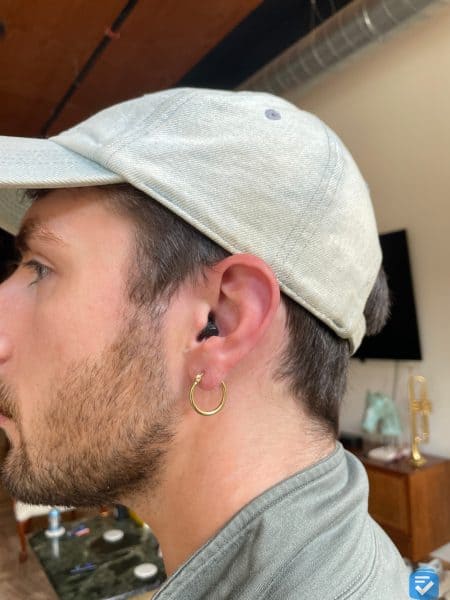
What Stood Out
Aside from their small size — which is impressive in its own right — Eargo hearing aids also have some advanced features that helped us fine-tune them to our hearing loss. For starters, all Eargo models had a battery life that lasted roughly 14 hours on a single charge. To recharge them, we placed them in the included charging case.
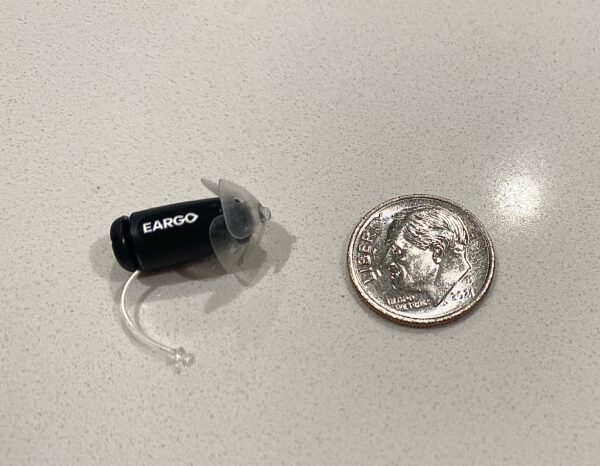
Both the Eargo 6 and Eargo 7 feature automatic sound adjustments. This meant that as our testers moved from quiet environments (at home watching TV) to loud ones (crowded cafes), the hearing aids would automatically adjust to diminish background noise.
Additionally, with every Eargo model, we could manually adjust our hearing settings through the Eargo app. With this app, we could adjust volume, noise reduction, and other settings. The app also allowed us to schedule remote screenings with Eargo’s team of hearing specialists. Unlike Jabra Enhance, which charges extra for access to its hearing team, Eargo includes lifetime support with all of its models for no extra charge.
Pricing
Eargo 6 hearing aids cost anywhere from $1,650 for the Eargo SE to $2,950 for the Eargo 7. All Eargo models come with a 45-day evaluation period so that you can be absolutely sure that they’re the right device for you.
In terms of warranties, the Eargo SE and Eargo 6 come with one-year warranties, while the Eargo 7 comes with a two-year warranty. To learn more about the specifics of this company’s warranty policy, read our guide to Eargo hearing aid costs.
Drawbacks
While Eargo hearing aids support remote adjustments through the Eargo app, they do not allow for Bluetooth streaming from your smartphone. If you’re looking to stream audio or phone calls directly to your hearing aids, we’d recommend a device from Jabra Enhance.
Our Verdict
When it comes to invisible hearing aids, no other model we tested had as reliable of a performance as the hearing aids from Eargo. To learn more about Eargo, check out our Eargo hearing aids review.
Pros
- Lightweight and comfortable
- Stellar sound quality
- Attentive customer service
- Secure in-ear fit
Cons
- Suitable only for mild to moderate hearing loss
- No direct Bluetooth streaming or streaming accessories
3. MDHearing - Most Affordable Hearing Aids
What We Like Most:
- Hearing aids from $297 for a pair
- 45-day trial period
- Behind-the-ear and in-ear models
- Rechargeable batteries
Overview
Cost: $297-$597 for a pair
Overview
With the launch of OTC hearing aids, we encountered many low-cost hearing aids to avoid; however, MDHearing’s devices proved surprisingly reliable. If you don’t need smartphone controls or Bluetooth streaming, then one of their hearing aids is a solid, budget-friendly choice.
What Stood Out
We won’t beat around the bush. MDHearing hearing aids lack the advanced features of Jabra Enhance and Eargo. There are no smartphone apps, Bluetooth controls, or automatic sound adjustments here; however, we did find that — for $300 — MDHearing’s devices performed far better than others in this price bracket.
>>Read more: The Best Affordable Hearing Aids
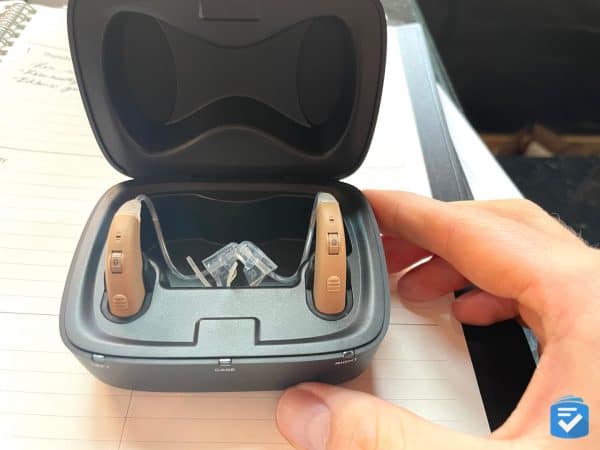
All four MDHearing models have rechargeable batteries, and in our tests, these batteries lasted between 12 to 16 hours on a single charge. That’s more than enough to make it through the day.
Additionally, in lieu of smartphone adjustments, we had to adjust these hearing aids manually by pressing switches on the hearing aids themselves. While some might find this annoying, we think this would be useful for the number of hearing aid users who don’t have a smartphone.
Overall, while we found that the sound quality of these hearing aids was not on par with those from Eargo or Jabra Enhance, they were still an effective way of amplifying noises that we wanted to hear. In particular, their premium model, the Volt, delivered a pretty solid performance, even in crowded and noisy environments.
Pricing
MDHearing devices start at $297 for the Air and Neo models. The more advanced Neo XS and Volt models cost $397 for a pair. These hearing aids can be returned within 45 days for a full refund, and each model comes with a 90-day warranty.
To learn more about the details of this warranty, read our guide to MDHearing costs.
Drawbacks
MDHearing provides lifetime customer support with all of its devices. However, since these devices don’t support remote adjustments, we found the experience to function more like tech support than a consultation with a hearing specialist.
Our Verdict
Lack of remote adjustments aside, we think that MDHearing hearing aids would be ideal for the user looking to address their mild hearing loss for a low price. To learn more about this company and its devices, check out our MDHearingAid review.
Pros
- 45-day, risk-free trial
- Affordable medical-grade devices
- FDA registered
- Easy online ordering
- Zero-Obligation Hearing Evaluation
- Can be purchased in pairs or as a single
Cons
- No in-person evaluations
- No personalized programming
4. Lexie - Best Audio Quality
What We Like Most:
- Smartphone adjustments
- Under $1,000 for a pair
- Powered by Bose technology
- Rechargeable and disposable battery options
Overview
Cost: $799.99-$990 for a pair
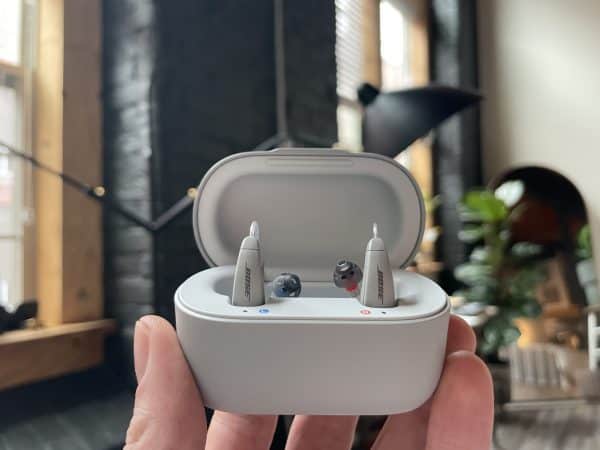
Overview
Lexie hearing aids feature noise reduction, water resistance, and Bluetooth streaming from a smartphone. With their Bose audio technology, we found that the sound quality with their devices was particularly superb.
What Stood Out
Naturally, when we heard that Lexie hearing aids were built with Bose hardware, we were excited to experience their sound quality. And after our extensive testing, it’s safe to say that we were impressed. Whether we were having a conversation at a crowded restaurant or watching TV at home, we found that the hearing aids did a fine job of amplifying the sounds we wanted while simultaneously minimizing those we didn’t.
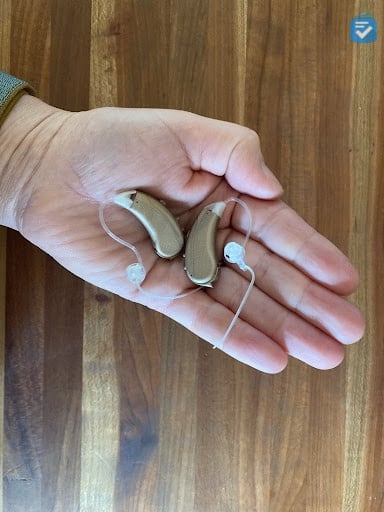
We found it a breeze to adjust the settings on our hearing aids through the app. With this, we could either toggle between listening environments or fine-tune the settings ourselves. Unfortunately, while all of Lexie’s models are compatible with the Lexie app, we were disappointed that only the B2 Plus could actually stream calls from a smartphone. That said, when streaming calls with our B2 Plus hearing aids, we were impressed by the sound quality, which far surpassed the audio quality on our Apple AirPods.
Pricing
Lexie hearing aids cost $799.99 for the Lumen and B1 models and $990 for the B2 Plus model. With each of these hearing aids, you’ll have a 45-day return window, during which you can get a full refund. In terms of warranties, each model comes with a one-year warranty. Lexi also offers a protection plan for $180; this covers accidental damage and loss of your hearing aids.
Drawbacks
While we have little negative to say about the B2 Plus, we did not like that Lexie’s other two models lacked the ability to stream audio directly from a phone — especially when the sound quality was so good. Luckily, the B2 Plus hearing aids are only $200 more expensive than the Lumen and B1 models.
Our Verdict
With options from $799, Lexie hearing aids are both affordable and reliable. To learn more about our experience with these hearing aids, read our Lexie hearing aids review.
Pros
- Intuitive smartphone app
- Great sound quality
- Free remote support
- Damage and loss protection
- Bluetooth functionality
Cons
- No rechargeable option
- No completely in-ear option
5. Widex - Best for Severe Hearing Loss
 View Pricing
Links to ZipHearing.com
View Pricing
Links to ZipHearing.com
What We Like Most:
- iPhone compatible
- Smart hearing aid technology
- Zen technology for tinnitus sufferers
- Behind-the-ear and in-ear models

Overview
Cost: $3,000-$6,000 for a pair
Overview
The only prescription hearing aid brand on this list, Widex hearing aids are impressive for their sheer amount of features and the professionalism of the care included with your purchase. While costs for these hearing aids might be high, they’re the only option on this list approved to treat hearing loss that is severe or profound.
>>Read more: The Best Hearing Aids for Severe Hearing Loss
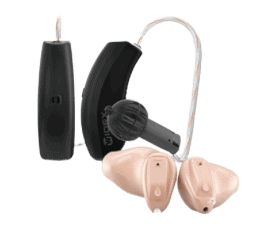
What Stood Out
There’s a reason that Widex hearing aids are among the most popular around, and that is the company’s wide range of models and technology. Across their SmartRIC, Moment, and Evoke models, we found useful smartphone apps, programs for tinnitus, and different styles, from traditional behind-the-ear to completely in-ear devices.
Across the board, we found that Widex hearing aids delivered exceptional sound performance. Additionally, since Widex makes prescription hearing aids, they can be used to treat severe or even profound hearing loss, whereas OTC hearing aids are only intended for those with mild to moderate hearing loss.
That said, since no one on our team has severe to profound hearing loss, we could not exactly test them. However, in our audiologist’s experience, patients generally experience positive outcomes from Widex hearing aids.
Pricing
Widex doesn’t sell hearing aids directly to consumers. In order to purchase their hearing aids, you can go to a hearing center that partners with them. Because Widex devices can be purchased from a variety of retailers, the pricing will vary. Generally speaking, however, their models will range from $3,000 to $6,000 for a pair. Warranty periods and amount of support will also vary by retailer.
Drawbacks
The biggest drawback of Widex hearing aids would undoubtedly be their high costs. Additionally, to obtain Widex hearing aids, you’ll have to visit an audiology clinic that sells them, and it’s not always clear which clinic sells which brand of hearing aids.
>>Read more: The Best OTC Hearing Aids
Our Verdict
If you don’t mind visiting a hearing health clinic and paying thousands of dollars for a pair of hearing aids, then Widex will offer some of the most advanced technology around. For more information, check out our rundown of Widex hearing aids.
Pros
- Great sound quality
- Comfortable to wear
- Smart, adaptable hearing aids
- Wide range of devices
- Zero-obligation hearing evaluation
- Risk-free hearing aid trial
- In-store purchase
Cons
- Professional fitting required
- Variable pricing
Other Brands We Considered
To create this list, we considered over 15 different hearing aid brands. Here are some other options worth mentioning:
- Beltone: Known for exceptional customer service, Beltone operates standalone clinics, and they create prescription hearing aids that treat a range of hearing losses. However, their high prices prevented them from making the list.
- Audien: While we appreciated the incredibly low prices of Audien hearing aids, not to mention their availability at Walmart, we found that Audien devices lacked most of the useful features needed to hear in noisy environments.
- Audicus: Audicus hearing aids performed well in our tests; however, their features were comparable to Jabra Enhance, and their pricing was nearly double that of this brand.
- Yes Hearing: Since Yes Hearing is not a hearing aid manufacturer, we did not include them on this list; however, this company can provide an easy way to get prescription hearing aids from the comfort of your home.
- ZipHearing: Similar to Yes Hearing, ZipHearing is not a direct manufacturer of hearing aids. Partnered with more than 600 audiologists, ZipHearing offers devices from the most widely known hearing aid brands on the market.
Who Are These Hearing Aids Best For?
Most hearing aids that can be purchased online are intended for individuals with mild to moderate high-frequency hearing loss. This type of hearing loss is the most common with age. Some hearing aids on this list come pre-programmed only for that type of loss.
If your hearing loss might have a different cause or is more severe, it would be good to get an in-person hearing test and hearing aid recommendation from an audiologist.


The Unexpected Effects of Hearing Loss
When we talk about hearing loss, it’s tempting to think of the condition as simply a nuisance — one that can be addressed by turning up the volume on the television or asking loved ones to speak louder and more clearly. Unfortunately, hearing loss has been linked to a web of pernicious side effects, including loneliness and cognitive decline. When a person loses their hearing, they’re less likely to engage in social activities and more likely to feel lonely. From there, social isolation can lead to an increased risk of depression, dementia, and anxiety.
To many people, however, hearing loss seems like a superficial issue, akin to losing one’s hair or gaining weight. This widespread perception is likely why, when it comes to older adults with hearing loss, fewer than one in three wear a hearing aid.
Bottom Line
If you haven’t figured it out by now, hearing aids are not cheap. Even the most affordable options will run you a pretty penny. This makes it all the more important to do your research and take the time to find a hearing aid that suits your needs.
A quality hearing aid will do more than just restore your hearing. It will allow you to reconnect with the world around you. Between people and the sound of the birds in your neighborhood, the world is rife with beautiful noises. Only through rediscovering them can you live life to its fullest.
To learn more about our favorite hearing aids, check out our thoroughly researched guides and reviews:
Best Hearing Aids Frequently Asked Questions
-
Where can you buy hearing aids?
Hearing aids can be purchased through either a hearing health provider or online. Regardless of the method you choose, it’s important that your provider administers a hearing evaluation in order to recommend the proper hearing device.
-
What is the best hearing aid on the market today?
The ideal hearing aid will vary depending on the user; however, Eargo, Jabra Enhance, and MDHearing make some of the best devices on the market.
-
Are Costco hearing aids as good as others?
Sonova, the world’s largest hearing aid manufacturer, makes Costco’s Kirkland-brand hearing aids. Because of this, Kirkland hearing aids are a highly reputable option.
-
What is considered the best hearing aid brand?
While there’s no universally accepted best hearing aid brand, the six most popular brands are Oticon, Phonak, ReSound, Signia, Widex, and Starkey.
-
What is the most advanced hearing aid?
In America, hearing aid features are not regulated and standardized by the FDA, so there’s no objectively most advanced hearing aid. The most recent advancements in the industry include direct streaming of cell phone calls and connectivity with other smart devices.
-
What is the most discreet hearing aid?
Completely-in-canal hearing aids are the most discreet, and most hearing aid manufacturers offer several models in this style.
-
What is the best inexpensive hearing aid?
Jabra Enhance, MDHearing, and Eargo offer some of the most affordable hearing aids, with Eargo offering nearly invisible models and MDHearing offering a number of devices for under $400 per pair.
-
Are cheap hearing aids worth buying?
We’d advise you to stay away from hearing aids on Amazon and eBay; however, MDHearing and Jabra Enhance sell high-performing hearing aids for affordable prices. They also include lengthy warranties.

